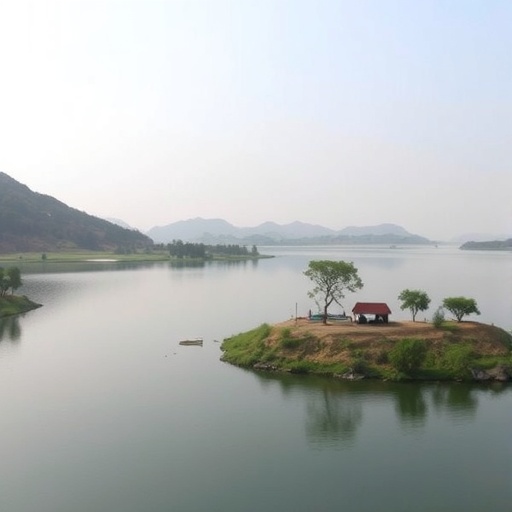Recent studies highlight the urgent need for sustainable management of urban water bodies amid rising pressures from urbanization and climate change. The latest research led by Maheshwari and Vyas provides critical insights into how land use and land cover (LULC) dynamics influence water quality and ecosystem health in urban environments, specifically focusing on Hataikheda Lake in Bhopal, India. This comprehensive evaluation emphasizes the delicate interplay between urban development and natural water bodies, underscoring a pressing environmental concern that merits widespread attention.
Hataikheda Lake, a vital water resource for the surrounding community, is undergoing transformations that reflect broader trends in urban land use. As cities expand, the encroachment of residential and commercial developments often leads to alterations in land cover that can severely affect local ecosystems. The researchers meticulously examined this phenomenon in the context of Hataikheda Lake, emphasizing that understanding the land-use patterns in its catchment area is paramount for sustainable water management strategies.
The methodology deployed by Maheshwari and Vyas integrated various analytical techniques, including field surveys, remote sensing, and Geographic Information System (GIS) tools. These methods allowed the researchers to effectively delineate catchment areas and assess how different land-use categories—such as agricultural, residential, and industrial—impact the quality of the lake’s water. This multifaceted approach not only lends credibility to their findings but also sets a precedent for future studies examining urban water bodies globally.
Their analysis identified significant correlations between specific land use types and pollutants detected in the lake. For instance, increased residential development was directly associated with higher levels of nutrient loading, which can lead to eutrophication—a serious ecological threat that can degrade water quality and harm aquatic life. The implications of such findings are profound, suggesting that urban planners must reinvigorate strategies to mitigate the adverse effects of urban sprawl on water resources.
Furthermore, the study extensively discussed the historical trends of land use changes surrounding Hataikheda Lake. This historical context is essential for understanding the present challenges faced by the lake, providing a holistic view of the evolving landscape over recent decades. The researchers presented compelling data illustrating how rapid urbanization has fundamentally altered the hydrology and ecosystem of the region, leading to increased sedimentation and pollution levels in the lake.
Despite the sobering realities presented in the study, the authors also underline potential pathways for action. They advocate for integrated water resource management (IWRM) approaches that consider interconnections between land use, water quality, and community health. This calls for collaboration among stakeholders, including local governments, urban planners, and communities, to formulate strategies that balance development needs with environmental sustainability.
Engagement with local communities is emphasized as a vital component of effective water management. The researchers highlight successful case studies where community involvement led to enhanced monitoring and protection of water resources. By fostering a cooperative spirit among residents and authorities, initiatives can be developed that promote awareness of water quality issues and encourage practices that protect the lake from further degradation.
In addition, the application of technology in monitoring and managing urban water bodies is addressed. The advent of smart sensors and advanced data analytics offers unprecedented opportunities to track changes in water quality in real time. This technological integration not only aids in immediate responses to pollution events but also informs long-term planning efforts. As cities increasingly embrace smart technology solutions, the potential for proactive environmental stewardship becomes more tangible.
The research presented by Maheshwari and Vyas is particularly relevant in light of global discussions surrounding urban resilience and sustainability. As the impacts of climate change become increasingly pronounced, cities must adapt to ensure their water resources remain viable. The case of Hataikheda Lake serves as a microcosm of the challenges faced by urban water bodies worldwide, prompting critical reflection on our collective responsibilities toward environmental preservation.
Moving forward, further research is necessary to explore the cumulative effects of urbanization on water bodies across diverse geographical contexts. Comparative studies that draw parallels between different regions can enrich our understanding of best practices and interventions. As we embark on this journey, collaboration among scientists, policymakers, and the public will be essential in crafting a future where urban development does not come at the cost of our vital water resources.
This study urges a paradigm shift in how urban water bodies are perceived in the context of land use planning and environmental management. Hataikheda Lake’s story is a call to action for stakeholders at all levels to prioritize sustainable practices that safeguard the ecological integrity of urban water resources. By acknowledging and addressing the challenges posed by land use changes, there lies an opportunity to shape a resilient and flourishing urban future.
In conclusion, the groundbreaking research conducted by Maheshwari and Vyas not only illuminates the complexities surrounding urban water bodies but also sets the stage for meaningful discourse on sustainable urbanization. The study invites readers to engage with pressing environmental issues and consider their roles in shaping a sustainable future. As more urban areas face similar challenges, lessons gleaned from Hataikheda Lake will undoubtedly resonate across the globe, urging a collective effort to protect our invaluable water resources for generations to come.
Subject of Research: Urban water quality assessment under the influence of land use change
Article Title: Evaluation of urban waterbody under the influence of land use land cover (LULC) in the catchment: A case of Hataikheda Lake, Bhopal (India)
Article References:
Maheshwari, S., Vyas, S. Evaluation of urban waterbody under the influence of land use land cover (LULC) in the catchment: A case of Hataikheda Lake, Bhopal (India).
Environ Monit Assess 197, 1175 (2025). https://doi.org/10.1007/s10661-025-14637-8
Image Credits: AI Generated
DOI:
Keywords: Urbanization, water quality, land use change, Hataikheda Lake, environmental sustainability, community engagement, integrated water resource management, technology in monitoring.




